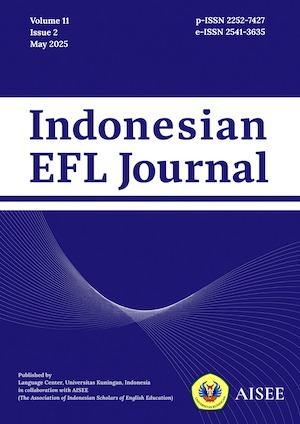TEACHERS LANGUAGE ASSESSMENT LITERACY: A SYSTEMATIC REVIEW
Abstract
As an integral part of teaching, assessment is critical since the information from the assessment is essential for many decisions in teaching and learning. Therefore, teachers must hold sufficient knowledge of assessment literacy. The interest in developing Language Assessment Literacy (LAL) has grown rapidly in the last few years. This growing interest for teachers LAL has sparked discussions related to the topics. This article aims to review research conducted related to the topic of teachers’ LAL. This research used a systematic review as the research methodology where 21 articles from various peer-reviewed and reputable journals related to language assessment literacy in the past five years were reviewed to understand LAL comprehensively. Five steps of the systematic review were done in this research, namely framing the questions, identifying relevant works, assessing the quality of the studies, summarizing the evidence, and interpreting the findings. The findings of the reviews reported that the research of LAL in the past five years were teachers’ LAL beliefs, the LAL beliefs and their assessment practices, teachers’ LAL training needs, and developing teachers’ LAL. The findings also suggested that teachers were still in needs of continuous support to develop teachers’ LAL because they lack of LAL training both for pre-service and in-service training. This research recommended that LAL training should be carefully planned to cater the needs of teachers assessment practices.
Keywords: Language Assessment Literacy; teachers’ language assessment literacy; LAL beliefs, assessment practices, systematic review
References
Ahmadi, M. R. S., & Ketabi, S. (2020). Features of Language Assessment Literacy in Iranian English Language Teachers’ Perceptions and Practices. 38(1), 191–223. https://doi.org/10.22099/jtls.2020.34843.2739
Babaii, E., & Asadnia, F. (2019). A long walk to language assessment literacy: EFL teachers’ reflection on language assessment research and practice. Reflective Practice, 20(6), 745–760. https://doi.org/10.1080/14623943.2019.1688779
Bahtiar, I., & Purnawarman, P. (2020). Investigating English Teachers’ Comprehension in Language Assessment Literacy (LAL). 508(Icite), 303–310. https://doi.org/10.2991/assehr.k.201214.253
Baker, B. A., & Riches, C. (2017). The development of EFL examinations in Haiti: Collaboration and language assessment literacy development. Language Testing, 1–25. https://doi.org/10.1177/0265532217716732
Bøhn, H., & Tsagari, D. (2021). Teacher educators’ conceptions of language assessment literacy in norway. Journal of Language Teaching and Research, 12(2), 222–233. https://doi.org/10.17507/jltr.1202.02
Coombe, C., Vafadar, H., & Mohebbi, H. (2020). Language assessment literacy: what do we need to learn, unlearn, and relearn? Language Testing in Asia, 10(1). https://doi.org/10.1186/s40468-020-00101-6
Firoozi, T., Razavipour, K., & Ahmadi, A. (2019). The language assessment literacy needs of Iranian EFL teachers with a focus on reformed assessment policies. Language Testing in Asia, 9(1). https://doi.org/10.1186/s40468-019-0078-7
Giraldo, F. (2018). Language assessment literacy: Implications for language teachers. Profile: Issues in Teachers’ Professional Development, 20(1), 179–195. https://doi.org/10.15446/profile.v20n1.62089
Giraldo, F. (2019). Language Assessment Practices and Beliefs: Implications for Language Assessment Literacy. How, 26(1), 35–61. https://doi.org/10.19183/how.26.1.481
Giraldo, F. (2020). A post-positivist and interpretive approach to researching teachers’ language assessment literacy. Profile: Issues in Teachers’ Professional Development, 22(1), 189–200. https://doi.org/10.15446/profile.v22n1.78188
Giraldo, F. (2021). A reflection on initiatives for teachers’ professional development through language assessment literacy. Profile: Issues in Teachers’ Professional Development, 23(1), 197–213. https://doi.org/10.15446/profile.v23n1.83094
Giraldo, F., & Murcia, D. (2018). Language Assessment Literacy for Pre-service Teachers: Course Expectations from Different Stakeholders. GiST Education and Learning Research Journal, 16(16), 56–77. https://doi.org/10.26817/16925777.425
Giraldo, F., & Murcia, D. Q. (2019). Language Assessment Literacy and the Professional Development of Pre-Service Language Teachers. Colombian Applied Linguistics Journal, 21(2), 243–259. https://doi.org/10.14483/22487085.14514
Janatifar, M., & Marandi, S. S. (2018). Iranian EFL Teachers’ Language Assessment Literacy (LAL) under an Assessing Lens. 307–328. https://doi.org/10.22108/are.2018.108818.1221
Khan, K. S., Khunz, R., Kleijnen, J., & Antes, G. (2003). five step for systematic review.pdf. Journal of the Royal Society of Medicine, 96, 118–121.
Kremmel, B., Eberharter, K., Holzknecht, F., & Konrad, E. (2018). Teacher Involvement in High-Stakes Language Testing. Teacher Involvement in High-Stakes Language Testing. https://doi.org/10.1007/978-3-319-77177-9
Levi, T., & Inbar-Lourie, O. (2019). Assessment Literacy or Language Assessment Literacy: Learning from the Teachers. Language Assessment Quarterly, 168–182. https://doi.org/10.1080/15434303.2019.1692347
Liu, J., & Li, X. (2020). Assessing Young English Learners: Language Assessment Literacy of Chinese Primary School English Teachers. International Journal of TESOL Studies, 2, 36–49. https://doi.org/10.46451//ijts.2020.12.05
Ölmezer-Öztürk, E., & Aydin, B. (2019). Investigating language assessment knowledge of efl teachers. Hacettepe Egitim Dergisi, 34(3), 602–620. https://doi.org/10.16986/HUJE.2018043465
Öz, S., & Attay, D. (2017). Turkish EFL instructors’ in-class language assessment literacy: Perceptions and practices. ELT Research Journal, 6(1), 25–44.
Puspawati, I. (2019). Understanding Teachers’ Knowledge, Skills, and Principles on Language Assessment: A Survey on Teachers’ Language Assessment Literacy. 353(IcoSIHESS), 70–75. https://doi.org/10.2991/icosihess-19.2019.11
Razavipour, K., & Rezagah, K. (2018). Language assessment in the new English curriculum in Iran: managerial, institutional, and professional barriers. Language Testing in Asia, 8(1). https://doi.org/10.1186/s40468-018-0061-8
Saputra, E. R., Hamied, F. A., & Suherdi, D. (2020). The development of beliefs and practices of language assessment literacy: does a professional learning community help? Journal of Education for Teaching, 46(3), 414–416. https://doi.org/10.1080/02607476.2020.1761250
Sevimel-Sahin, A., & Subasi, G. (2019). An overview of language assessment literacy research within English language education context. Journal of Theoretical Educational Science, 12(4), 1340–1364.
Sultana, N. (2019). Language assessment literacy: an uncharted area for the English language teachers in Bangladesh. Language Testing in Asia, 9(1), 1–14. https://doi.org/10.1186/s40468-019-0077-8
Uman, L. S. (2011). Information Management For The Busy Practitioner Systematic Reviews and Meta-Analyses Information Management for the Busy Practitioner. J Can Acad Child Adolesc Psychiatry, 20(1), 57. www.cochrane.org
Ungvarsky, J. (2020). Systematic Review. Salem Press Encyclopedia.
Yan, X., & Fan, J. (2020). “Am I qualified to be a language tester?”: Understanding the development of language assessment literacy across three stakeholder groups. Language Testing, 1–28. https://doi.org/10.1177/0265532220929924
Yastibas, A. E., & Takkaç, M. (2018). Understanding Language Assessment Literacy: Developing Language Assessments. Journal of Language and Linguistic Studies, 14(1), 178–193.
Zulaiha, S., Mulyono, H., & Ambarsari, L. (2020). An investigation into EFL teachers’ assessment literacy: Indonesian teachers’ perceptions and classroom practice. European Journal of Contemporary Education, 9(1), 189–201. https://doi.org/10.13187/ejced.2020.1.189









